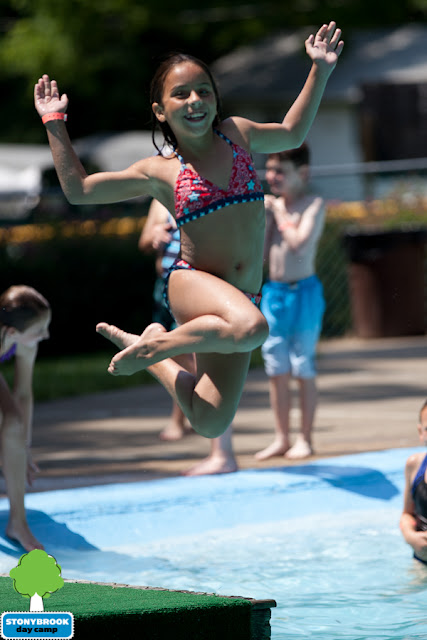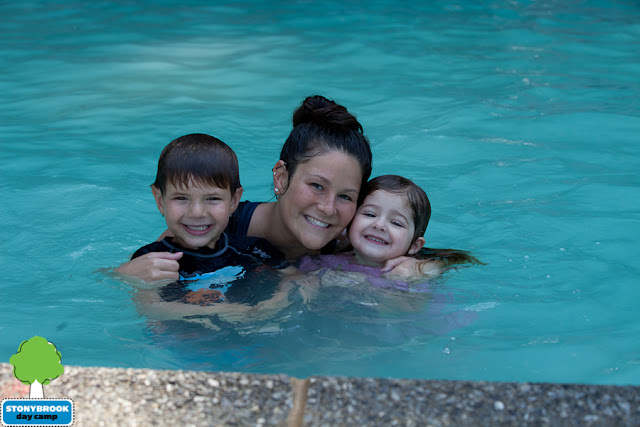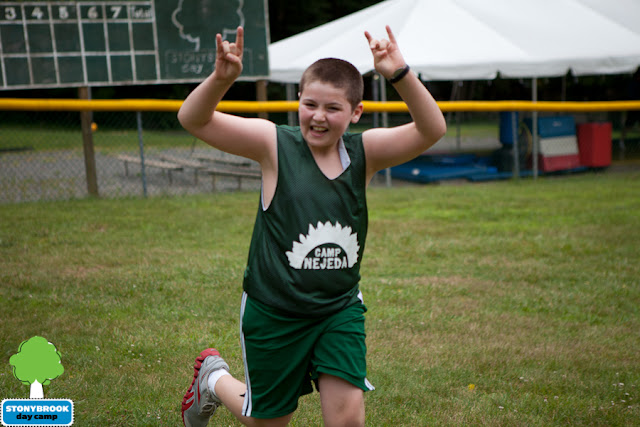We know how hard it is to send our little ones off to camp alone and be separated from us. Believe us...WE have all had to deal with it.
Separation and Transition
Cindy Rzasa Bess, Ph. D.
Personal Note:
Separation and transition have a whole new meaning for me after this past weekend. As many of you know, my beautiful, eldest daughter, Kara-Lynne, was married to her wonderful Texan, Chase, on Saturday. It was the most glorious time; however in one fell swoop, we gave away our baby girl, and added a son. Like they say, the greatest gifts you can give to your child are roots to grow and wings to fly.
Separation is not just something that happens to our children when we encounter change. Separation happens to us adults, too. If there are two that have to separate, then there are two who feel the pangs. Separation is with us constantly, from saying “goodnight” to our babies as we put them to bed, to packing away their belongings for their first semester of college, to the day they grow up, get married and move away. It is a factor of life, and we have many opportunities to practice it and learn from it.
Transition is what follows the separation, and here the lessons learned are completed independently. Both children and parents have to readjust after a change has taken place and adapt to the new experiences that come with being on their/our own. Transitions are not done in isolation though…. everyone can have help through the readjustment period, and that often helps.
When our children go to an early care and learning center or to preschool, we can depend on the experience of the caregivers and teachers to help them make the break from your loving and supportive arms and quickly adapt to the new experience they will have while away from you. Adults can also benefit from the care and support of others as they move back out into the “big” world. Everyone can use a helping hand at the door, a gentle touch on the shoulder, and listening ear when they are feeling sad while away from their “baby.”
Do you remember that first time you tried to leave your nine month old with a babysitter? Do you recall how upset your child was at the thought of breaking from you and seeing you go? That was separation anxiety, something commonly experienced by older babies. Separation anxiety is the extreme fear of being removed from a significant person or situation. It is exhibited through intense emotionality- such as crying and refusing to join the new situation. What is perceived as a manageable amount of stress to adults can be overpowering to young children. Young children, especially when separated from a parent or caregiver for the first time, often feel very stressed. They display a number of stress reactions that can appear totally overwhelming to the child, such as crying, screaming, refusing to participate, hanging on to your leg as you try to go, etc.
Although these responses may be difficult to watch as a parent or teacher, they are a normal reaction to change and are typical in early development. Who doesn’t prefer the familiar to the new? Change is not often welcome at any age. It often must run its natural course in order to be resolved. You can’t make a child separate easily. You can only support him or her through the process. Take your cues from the child’s level of anxiety. A balance must be achieved in order for your child to realize it is okay to have a life in a different space. The key is support- emotional and social support.
Before assuming that this is all related to the child, stop and take a look at yourself. How are you reacting? What is your facial expression? How much tension are you exhibiting as you try to part? Are you upset yourself? Exasperated? What is your reaction to the separation? Are you sending cues to which your child is responding?
Now open the scope of your vision and look at your child. What could you do to make him feel safe? What can you give her so she feels secure while you are gone? Facilitate the break by leaving something of yours behind. When I was a preschool teacher, I would ask the mother to leave something that smelled like her, a scarf, a hairbrush… children respond best, and are comforted most, by smells that make them feel safe, and that is often the scent of mom and dad - their soap, shampoo, fragrance, etc. Wear a t-shirt and then leave it for the child to use a pillow cover at naptime. That will help them relax, cuddle and fall asleep. (This can work at home for night-time, as well.)
Sing songs that subliminally will remind them that you are coming back – such as Hap Palmer’s “Mommy Comes Back” or read a story like The Kissing Hand and make a lipstick kiss on your child’s hand before leaving so you linger there all day. Support them in special ways and they will make it through separations.
If they are going to Kindergarten this year, help them make it through the longer day by slipping a love note in their lunchbox. Remember to own your emotions rather than assume they understand why you are tearing up when leaving them for the first day of school. They will not say, “Oh my mom is crying because she is experiencing a profound moment.” They will see it is as possible fear or concern that you feel they will be unsafe or there is something of which you are unsure. Be honest, tell them you are teary because they are growing up and you are so proud of them.” Don’t lose it in front of them, if you can, leave the room before the tears flow. I am the biggest sap there is. I cried like a baby the whole wedding and at the reception. Everyone knows that is how I am. So I carry tissues everywhere, or my husband has a supply in his pocket. You do what you have to in order to make it through the experience).
Step back and look at the entire group…. Is your emotional or physical presence affecting others? Some parents linger too long in the room; and inadvertently start a “cry-go-round” (or the opposite of a merry-go-round.) That is, one child has his or her parent present, and others begin to see that theirs is gone and become emotional as a result. Be aware if are you prompting the cry-go-round, and if so, be helpful and depart, otherwise everyone will pay the emotional price… longer.
Reassure your child that you will be back. Leave within a reasonable window. Refrain from acting like the parting will hurt you, because they will then be torn about going into the room and having fun. They will be concerned about you, rather than learning to be independent. Resist sneaking out. They need a clear signal that you are leaving, even if it is accompanied by tears. If you sneak out they will search for you the whole time you are gone, and will learn NOT TO TRUST YOU in the future. As a Twos teacher, I was notorious for screaming “Bye-Bye Mommy!” when a parent would try to escape unnoticed. The child deserved that respect.
It is okay that they have a tough time saying good bye. They are showing you how important you are to them. Believe me from years of experience, they settle down, feel safe again and will adjust to the new daily routine and have fun at school. At pick-up, come back on time, don’t be the last to arrive because that makes them anxious in future situations. Come into the room “tech-free” …No cell phone or Bluetooth apparatus sticking out of your head, no blackberry or high-tech device in your hand. Be totally available to your child because the reunion should be only about you two.
Last, but certainly not least… Don’t remove “loveys” at this time from your child, such as pacifier, favorite toy, or blanket. They enable better coping and provide security. If you feel that your child is “too old” to bring a “lovey” into the room; or, if there is a strict policy about bringing in toys from home; then keep it with you in the car. If you can get permission for a “lovey” to remain in a cubbie and be visited throughout the day then do so. Be respectful of the school policies, and hopefully the school will be respectful of your child’s individual needs as well. It is “give and take” on this point so work with the teacher… they really know what they are doing.
Children are fearful of things they don’t know or understand. It is important to help a child overcome their fears by providing social support and encouragement throughout the process. Give them the information that they need to make a successful change. Help them achieve a sense of mastery and/or familiarity. Provide opportunities to face and resolve their fear and thereby feel accomplished- but go at the child’s pace!
Transition
Separation is the physical act of leaving someone, but transition is the psychological ramifications that follow, and sometimes even precede, a change. When things are different, the psychological and emotional adjustments are the hardest to achieve. This type of transition can occur anytime: when leaving the home for school, between activities, when leaving the school for home, at key points in the daily routine (getting ready in the morning, dinnertime, bedtime, etc.) The best way to deal with transitions is to have ample preparation and be positive.
• Keep directives short, if you must use them.
• Stay calm. Don’t raise the level of anxiety by rushing. Give yourself enough time.
• Stay in control. Power struggles reduce everyone to the youngest person’s age.
• Be clear and straightforward. Don’t change the plan and confuse the situation. Confusion breeds anxiety. Explain things, briefly, in advance
Remember that when things are stressed, we naturally take the negative course of thought- children will say they hate school and embellish this point with stories. This may not always be a true representation of what is actually happening. They might just be reacting to the new routine of “going to school”. (Something they might not have bought into for the long-haul.)
Enabling Transition:
Providing supportive communication helps.
Give information in advance to the child when entering new situations. Help him understand what is causing the stress and try to change these causes. Before arriving, help them think through the transition to school in the car- ask questions like: Who do you think is already there? What color do you think the teacher is wearing? What toys do you want to play with first? By asking questions, you move the child into the psychological space in advance and help them make choices before they actually face them. Most entry transitions occur because the initial morning situation is overwhelming- lots of movement, lots of people, lots of noise, and too many choices they are not prepared to make.
Trust the teacher to know what to do.
The teacher has done this with dozens of children over the years. They are prepared to work with your child as they have with many others. Offer support but also listen to what they suggest. If they say, you don’t need to stay, then leave. Don’t hang around and prolong the transition. If they ask you to sit in the lobby during transition, please do. They think that this will help your child.
We are parents for life. We will always hold our children close at heart and feel the pangs of separation and the discomfort about transitions…. But remember, they follow our cues and imitate what they see modeled. If we do our job well, they will do their well…
If that doesn’t help remember tears help keep the eyeballs clean.
A special thanks to Dr. Bess for sharing this information!
For more information please contact Dr. Bess at:
Education Consultant: cindy@thebesschoice.com
Family Facilitator: www.thebesschoice.com
Don't forget to

























































